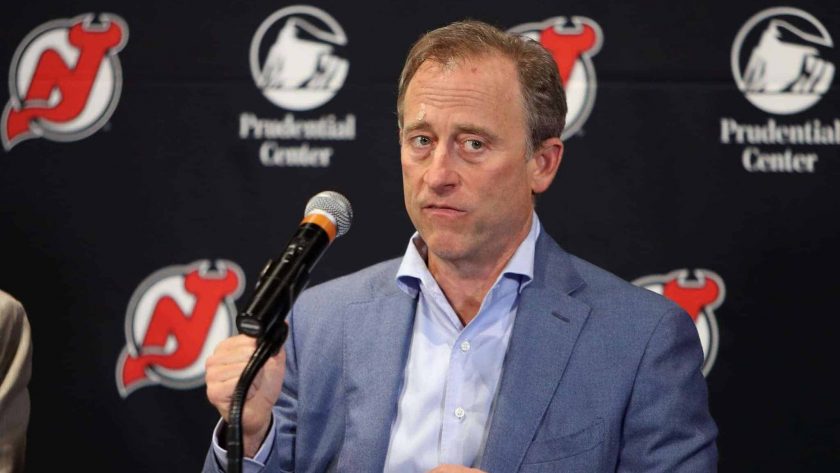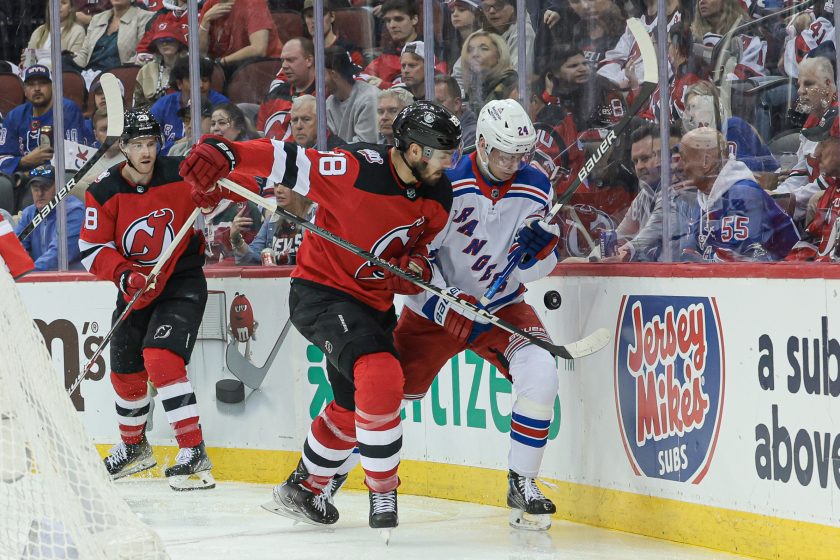New Jersey Devils 2020 NHL Entry Draft recap

New Jersey Devils fans won’t have much to complain about after seeing how their team handled the 2020 NHL Entry Draft.
For the first time ever, the New Jersey Devils possessed three first-round picks this year. And overall, they did pretty well on day one.
With their first pick — the No. 7 overall selection — the Devils took 18-year-old Swedish right winger Alexander Holtz, whose biggest strengths are his shot (he has one of the best in his entire draft class) and the fact that he puts the puck in the back of the net.
Goal scoring, especially from the wings, is the Devils’ most glaring weakness, and that’s why they valued Holtz so greatly.
In three games for Djurgårdens IF J20, Holtz record a whopping nine points (seven goals, two assists). Throughout the season, he scored 16 points in 35 games. No Swedish skater under the age of 19 scored more last year in the SHL.
The Devils didn’t miss with this pick and Holtz could easily end up becoming their most dangerous goal scorer.
With their next pick, No. 18 overall, the Devils took soon-to-be 19-year-old center and right winger Dawson Mercer. Hailing from Newfoundland, Mercer clearly brings versatility to the table and is projected to be a middle-six forward for the Devils.
In 42 games in the QMJHL last season, Mercer notched 60 points (24 goals, 36 assists). His most glaring weakness is his skating ability, but everything else about his game makes this a great pick.
So far, the Devils are two-for-two. Enter their third and final pick of the first round.
With the No. 20 overall selection, the Devils chose 18-year-old Russian left-handed defenseman Shakir Mukhamadullin. This was probably the Devils’ worst pick of the entire draft, but let’s talk about the good, first.
Mukhamadullin is a good skater and playmaker. He additionally sports a powerful shot and is physical, thanks to his size: he stands at 6-foot-4 and utilizes his body in how he plays.
However, he’s a project, and that’s why he probably shouldn’t have been taken so high. As of right now, he can’t be categorized as an offensive defenseman.
Mukhamadullin does have six points in 16 games with Ufa in the KHL, which might be an indication that he’s working on that part of his game, but it is uncharacteristic (he scored just one point in 27 games last season).
He was projected to be a late second, early third-round pick by most draft experts. The Devils would’ve probably been better off drafting a forward here, but if they did want a defenseman, better and less risky players were still on the board.
Mukhamadullin won’t be coming to New Jersey anytime soon, so he does have time to grow and develop. But as of right now, this pick is a giant question mark.
The Devils would not pick again until the third round. With the No. 84 selection, they took goaltender Nicolas Daws, who’s 19 years old, 6-foot-4, and catches left.
Like Mercer, Daws is an older prospect but that might be to his advantage. In 2019-20, with Guelph of the OHL, Daws notched a 23-8-6 record with a 2.48 GAA and .924 SV%, recording five shutouts.
He led the OHL in save percentage and finished third in GAA. He struggled during the 2018-19 season as a backup (3.25 GAA, .893 SV%) and went undrafted.
He did make the Canadian team for the U20 World Junior Championship but struggled there as well, recording a 5.83 GAA and .840 SV% before finding the bench after just two appearances.
However, he clearly improved his play and was good enough this past season to become the top-ranked North American goalie. Clearly, the extra time gave him experience and allowed him to develop.
He was voted the most improved OHL player of the year for good reason.
According to Al Jensen of NHLCSB, Daws is the best puck handler of the draft.
Corey Pronman of The Athletic praised his movement around the crease along with his lateral ability but expressed concern with regard to his quickness, specifically whether or not he can move fast enough at the NHL level in order to make big saves.
Daws has spent most of his career as a backup and his first season as a starter was cut short after the COVID-19 outbreak. For this reason, he’s going to need a lot of time before making it to the NHL, maybe around four years.
This shouldn’t be a problem for the Devils, however, who will use that time to see what their young, impressive goalie MacKenzie Blackwood can do for them.
The Devils had two fourth-round picks this year. With the initial of these — the No. 99 overall pick — they selected Czech center Jaromir Pytlik. The 19-year-old isn’t perfect and has much to work on, but this was a good value pick.
Some sites, including Elite Prospects, had him going in the second round, so the Devils got lucky with this one. Pytlik recorded 50 points in 56 OHL games this past season.
The biggest question surrounding Pytlik is his offensive upside. He isn’t the best skater either, but he brings a lot of good to the table. He’s a physical, two-way center who’s fantastic on the boards. He also possesses a good shot and is a great stick-handler.
Pytlik will likely shine the brightest on the penalty kill, especially because he’s so well-rounded. He’ll need some time, especially with the number of centerman prospects the Devils have, but he can become an important piece to the team in the future.
With their second fourth-rounder, the No. 120 pick, the Devils drafted Ethan Edwards. The Canadian is a 5-foot-10 left-handed defenseman who’ll be playing hockey at the University of Michigan.
Edwards is an offensive-defenseman and the hope is for him to continue to develop in college.
This was a decent value pick but a risky one, mainly because they don’t really know what they’re getting with him. Nonetheless, he’ll need at least three years before coming to the NHL and thus has time to perfect his craft.
Edwards is praised for his speed, skating ability, and lateral movement. The Athletic’s Scott Wheeler called him one of the biggest sleepers of the draft.
His offense is seemingly great already but he’ll need the time in college to work on his defense and to grow in size.
The Devils used their fifth-rounder on another center, Artem Shlaine, who’s currently playing his first season of collegiate hockey at the University of Connecticut.
At Shattuck-St. Mary’s, the prep school he attended, Shlaine led his team with 78 points (26 goals, 52 assists). He isn’t very fast and isn’t known for being a finisher, but is praised for his playmaking ability.
He’s incredibly smart and makes excellent decisions with the puck. The Devils are also going to want to see how he grows in college.
There seem to have been higher-ranked players available here, but it’ll be a few years before we truly know what Shlaine can do at the NHL level.
And with their final pick of the draft in the sixth round, No. 161 overall, the Devils took yet another center in Benjamin Baumgartner.
It’s unclear why the Devils love drafting centers, but Baumgartner is already 20 years old and is AHL eligible. In fact, he’s the oldest player in this draft class.
He isn’t the biggest of centers, standing at just 5-foot-9 and weighing 165 pounds. Baumgartner was another good value pick though, especially since he’s been so productive in Switzerland. Nonetheless, the number of centerman prospects the Devils employ is puzzling.
He went undrafted the past two years but performed well enough last season to gain the attention of the NHL this time. Baumgartner scored seven goals and recorded 20 assists in 37 games last year for HC Davos, one of the Swiss League’s senior clubs.
He’s well-rounded: he can be used on the penalty kill and is a good passer. Scouts emphasize, however, that he needs to work on his shot and must physically grow in size.
His defense and playmaking ability are huge pluses though and will be valuable assets if he does end up making it to the NHL.
Overall, the Devils underwent a solid draft. They acquired a gem in Holtz, a great player in Mercer, and some truly solid value picks. The organization and fanbase hope the players taken in this draft can help turn this team around in the near future.
- DRAFTKINGS SPORTSBOOK
BET $5 & GET $150 IN BONUS BETS INSTANTLY!
- FANDUEL SPORTSBOOK
BET $5, GET $150 BONUS!
- CAESARS SPORTSBOOK
$1,000 BET ON CAESARS!
- BETMGM SPORTSBOOK
BET $5, GET $158 BONUS!
- BET365
GET $150 BONUS OR $2,000 FIRST-BET SAFETY NET!
Leen has written about the MLB, NBA, NFL, NHL, and international soccer. She is currently the primary NHL writer for ESNY. Leen's work has been featured on Bleacher Report and she was formerly a contributor for FanSided's New York Mets blog, Rising Apple. She is a co-host of the Yankees-Mets Express podcast.











